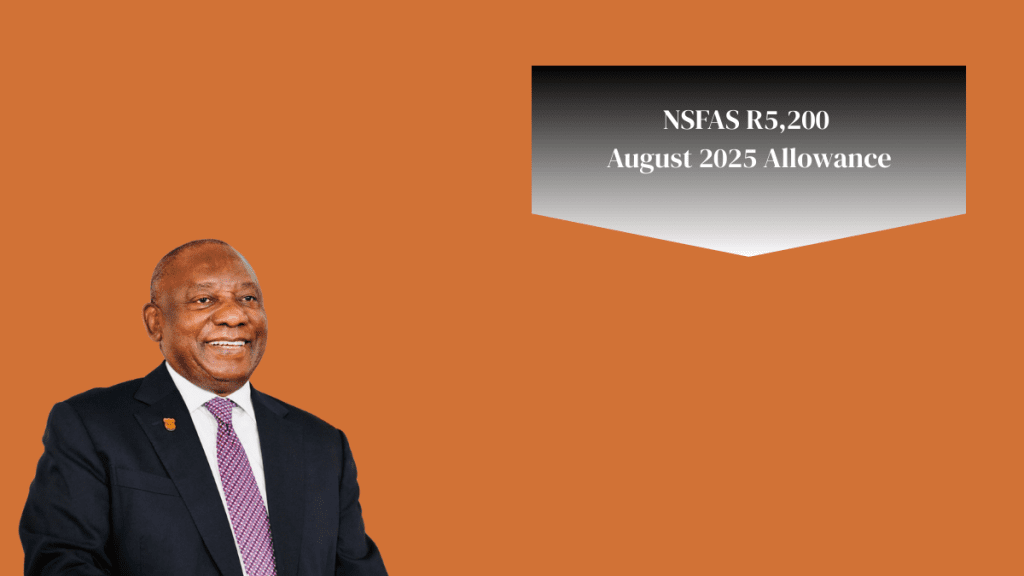Meta Description: NSFAS will disburse a R5,200 allowance on 19 August 2025 to qualifying students. Learn who qualifies, how to claim, avoid common issues, and plan your funds effectively.
For many South African students, the National Student Financial Aid Scheme (NSFAS) is more than financial support—it is the key to accessing higher education. From August 2025, NSFAS will issue an allowance of R5,200 to qualifying students. This amount is intended to help cover essential needs such as accommodation, meals, transport, and study materials.
To ensure smooth payment, students must understand who qualifies, how to verify their eligibility, and the correct steps to claim their allowance.
Who Qualifies for the NSFAS R5,200 August 2025 Allowance?
To receive the August allowance, students must meet certain criteria:
- Be a South African citizen.
- Be registered at a public university or TVET college.
- Have a combined household income below R350,000 per year.
- Maintain academic eligibility as determined by their institution.
- Students with disabilities also qualify, with additional support.
- Continuing students who enrolled before 2018 and whose household income is below R122,000 may still be eligible.
The allowance is designed to support students from disadvantaged backgrounds by ensuring that finances are not the barrier to completing their studies.
How to Claim the NSFAS R5,200 Allowance
NSFAS will disburse the August allowance on 19 August 2025. To ensure you receive it without delays:
- Update your myNSFAS account:
- Log in to the NSFAS portal.
- Confirm that all your personal, academic, and banking details are correct.
- Verify your bank account:
- The account must be active and in the student’s name.
- Ensure it is compliant with NSFAS requirements.
- Institutional Records:
- Universities and TVET colleges must submit proof of registration and attendance for each student.
- Confirm with your institution that your documents are up to date.
- Track your allowance:
- Check your myNSFAS portal regularly for updates.
- Payments may reflect in either your bank account or through institutional disbursement systems.
If payment has not been received by 21 August 2025, students should immediately contact their institution’s financial aid office or the NSFAS helpline.
Avoiding Common Issues
Two of the most frequent problems faced by NSFAS beneficiaries are:
- Incorrect banking details: Always double-check that your account details match the information on your myNSFAS account.
- Missing academic records: Failure by institutions to submit proof of registration or attendance may delay payments.
To avoid setbacks:
Useful links:
- Upload all required supporting documents (ID, proof of income, registration forms).
- Regularly check your myNSFAS portal for notifications.
- Use only official NSFAS communication channels to prevent falling victim to fraud.
- Make use of the NSFAS WhatsApp line or customer care if problems arise.
Being proactive with your records will ensure that your allowance is not delayed.
Planning the NSFAS R5,200 Allowance
Receiving a lump-sum allowance can feel overwhelming, especially for first-year students. Financial planning is crucial. The stipend is meant to cover:
- Accommodation
- Meals
- Transport
- Learning materials (e.g., textbooks, stationery, digital tools)
Tips for Budgeting Your Allowance:
- Create a monthly spending plan to stretch the allowance across the semester.
- Prioritise rent and meals before allocating money to other expenses.
- Make use of student discounts on textbooks, software, and transport.
- Set aside a small portion for emergencies.
- Consider using campus financial literacy programmes or workshops to improve money management skills.
With proper planning, the R5,200 can cover essential needs and prevent financial stress.
Why This Allowance Matters
The NSFAS allowance is not just a transfer of money—it is a step towards leveling the playing field in education. For thousands of students, this financial aid means:
- The ability to remain enrolled without dropping out due to lack of resources.
- Access to better study environments, nutrition, and transport.
- A pathway towards achieving qualifications that will improve future employment opportunities.
By providing both funding and support structures, NSFAS helps shape a more inclusive higher education system in South Africa.
Final Thoughts
The NSFAS R5,200 allowance for August 2025 is a lifeline for many students, but it requires attention to detail when claiming. Ensure your records are updated, banking details are correct, and that your institution submits proof of registration on time.
Students are encouraged to stay vigilant against fraud, make use of NSFAS support services, and budget their funds wisely. With responsible management, this allowance will not only sustain daily student life but also contribute toward long-term academic success.
For updates, students should regularly visit the official NSFAS website or consult their institution’s financial aid office.



